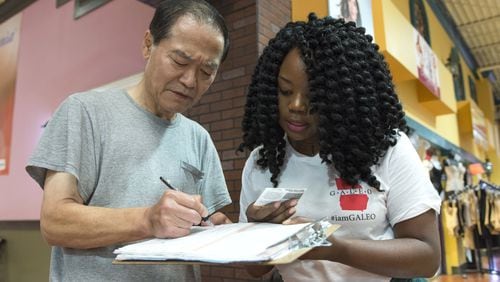Perhaps in response to the most contentious presidential election in modern times, minority voter registration in Georgia has surged over the past year, with nearly 342,000 new voters added to electoral rolls.
An Atlanta Journal-Constitution analysis of voter registration data shows minority voter registration rose 23 percent. White registration rose 15 percent, and still accounts for nearly 57 percent of the state’s voters.
Studies and polls show minority voters tend to vote for Democrats. University of Georgia political scientist Charles Bullock doubts the growth of minority voters will be enough to deliver the Peach State to Democratic presidential candidate Hillary Clinton this year. But he said a future where Democrats are competitive may not be far off — maybe in the next four years in Gwinnett County.
Georgia’s second-largest county has been a Republican stronghold for 30 years. The AJC’s analysis shows that, for the first time, a majority of Gwinnett voters did not identify themselves as white on registration forms. Bullock believes Gwinnett will swing to the Democrats by 2020.
“It’s just a matter of time before Gwinnett turns Democratic, and an election cycle or two after that for Cobb,” he said.
The newspaper analyzed voter registration statistics compiled by the Secretary of State’s Office in 2015 and after last week’s registration deadline for the November general election.
The analysis showed black voter registration rose 20.5 percent statewide; Asian registration rose 40.7 percent; and Hispanic registration rose 46.2 percent.
The share of Georgia voters who are white fell from 58.5 percent a year ago to 56.9 percent this week.
Bullock said the share of white voters has fallen even further since the last presidential election four years ago, when it was 59.2 percent.
In Gwinnett, the share of voters who identified themselves as white dipped to 48.7 percent this month. Another 38.7 percent of voters identified themselves as black, Hispanic, Asian or American Indian. The remainder marked “other” race when they registered or did not identify their race at all.
Minority registration has risen 30 percent in both Gwinnett and Cobb counties over the last year. It rose nearly 22 percent in DeKalb and 24 percent in both Fulton and Clayton counties.
The rise in minority voter registration comes amid a presidential campaign in which immigration has become a divisive issue. Republican nominee Donald Trump has proposed building a wall along the Mexican border to stop illegal immigration, called many Mexican immigrants rapists and criminals and pledged to ban Muslims from entering the country.
Civil rights advocates say Trump’s comments have spurred many minorities to register to vote for the first time.
Dinesh Sthanki has lived in the United States for more than 30 years and has been a U.S. citizen for a decade. But he never registered to vote until this month, when he found a registration booth at a shopping mall in Norcross. He said he was motivated to register by Trump’s candidacy.
“I wish people realized the shallowness of this gentleman,” Sthanki said.
Antonio Molina, the Latino caucus chair for the Georgia Democratic Party, said minority votes could be decisive in delivering the Peach State to Clinton this year.
“There’s a lot of change going on,” Molina said. “Obviously, the undertone to all this is the type of policies that Trump has been speaking about.”
Leo Smith, who leads the Republicans’ minority outreach efforts in Georgia, acknowledged Trump’s comments have made his job harder. But he said Democrats don’t have a lock minority voters.
“You can’t make the assumption that all the new voters of color are going to be Democratic voters,” Smith said. “(Republicans) want to be relevant to all of our citizens.”
Emory University political scientist Alan Abramowitz said demographic shifts alone won’t be enough to carry Georgia for Clinton this year. He said she’ll need to do better among white voters than Barack Obama, who carried just 25 percent of white voters here in 2008.
But Abramowitz believes Georgia’s time as a battleground state in presidential elections has arrived.
“I think it will be close,” he said. “My guess is she’ll be within three points. That means she’s got a chance.”
About the Author








